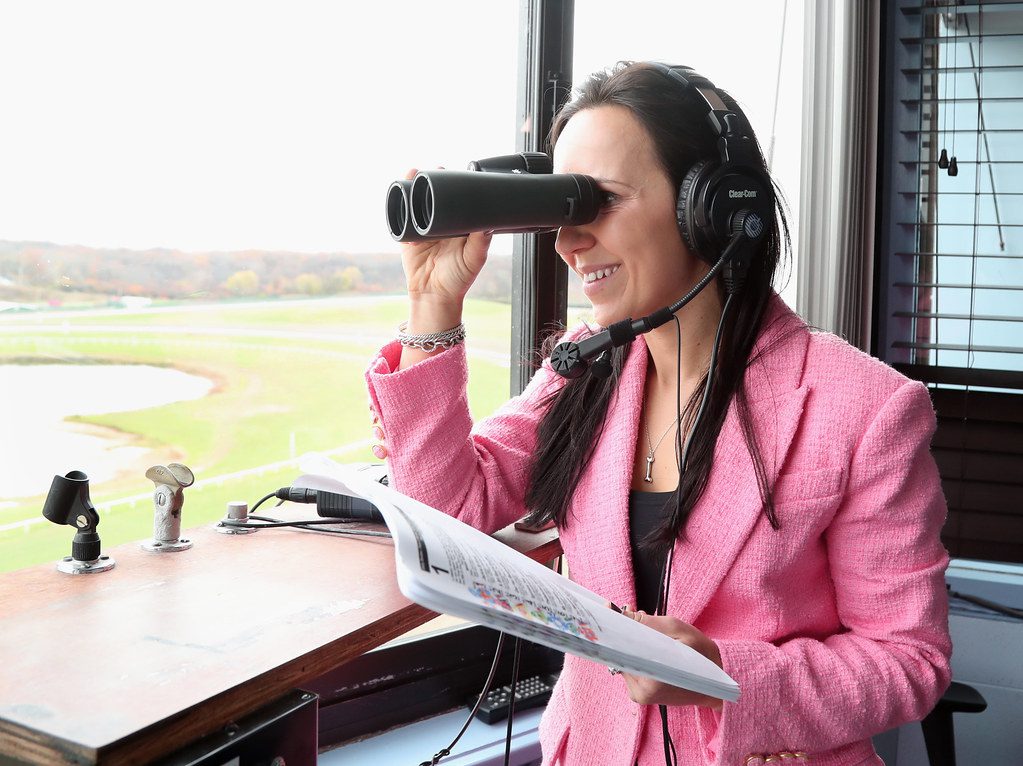
Jessica Paquette in the announcer’s booth at Parx Racing (Nikki Sherman/EQUI-PHOTO)
By Ashley Tamulonis
It is no secret that horse racing has always been and still is a male-dominated industry; however, women have made inroads over the years. Diane Crump was the first woman to ride professionally in the United States and the first woman to ride in the Kentucky Derby in 1970. Julie Krone was the first woman to win a Triple Crown race (Belmont Stakes, 1993). Jenine Sahadi was the first woman to win a Breeders’ Cup race and also a million dollar race with Lit de Justice in the 1996 Breeders’ Cup Sprint. She came right back to win the Sprint again the next year with Elmhurst and Kathy Ritvo was the first woman to train a Breeders’ Cup Classic winner when Mucho Macho Man won it in 2013. Women have gradually been breaking the glass ceiling that still predominates the sport.
Though women have broken through at the highest levels in training and riding, there is still one area in the industry that continues to be almost exclusively comprised of men: the role of track announcer. All the most iconic calls have been made by men. From Chic Anderson’s “He’s moving like a tremendous machine” call of Secretariat’s Belmont Stakes triumph to Tom Durkin’s “Rachel Alexandra! Macho Again! It’s going to be desperately close. Here’s the wire. Rachel won! She is indeed Rachel Alexandra the Great” call of Rachel Alexandra’s historic win over older males in the Woodward, men have been the voice narrating some of racing’s most exciting moments. But, like the larger world around it, the horse racing industry is diversifying, opening up the doors for a woman to leave her indelible stamp on the Sport of Kings.
Enter Jessica Paquette. As the newly minted track caller at Parx Racing, she is going where few women before her have gone. In 2016, Angela Hermann took over the position at Golden Gate Fields when Michael Wrona departed to fill the retired Trevor Denman’s place at Santa Anita. Before her, Ann Elliott worked as the voice of the now-defunct Jefferson Downs, where the mighty John Henry began his fabled career, in the 1960s.
Every story has a beginning and Paquette’s began in Salem, New Hampshire where she was a regular then an intern, at the now-demolished Rockingham Park. From there she moved on to Suffolk Downs in Boston, Massachusetts before moving her tack to Colonial Downs in Virginia and Sam Houston in Texas as a racing analyst.
Ms. Paquette got her first taste of calling races in 2014 at Suffolk Downs when she was asked to fill in for the regular announcer. “At that time, it was just the biggest thrill of my life, and I thought it was a one-off,” she enthused when asked about the experience.
Years would pass before another occasion to call races would present itself to her. This time it was Sam Houston asking her to step in for a weekend in 2020 calling Quarter Horses. She did it again the following year, and it was at that point the idea of announcing regularly really blossomed. By the time Paquette landed the track announcer position at Parx, most of her race-calling experience had been at Sam Houston announcing the Quarter horse races.

“Primarily, my experience in the announcer’s booth had been calling Quarter horses, and I learned very quickly that there is a big difference between 250 yards and a Thoroughbred race,” Jessica Paquette acknowledged when asked if her experiences at Suffolk Downs and Sam Houston had prepared her for announcing at Parx. She continued, “There is more of a story to tell in a Thoroughbred race, particularly in a route race, and I am really enjoying the challenge of developing the right pace and cadence for that.”
As with any job, calling races comes with its own set of challenges. Each race typically features anywhere from three to fourteen horses (twenty if the race in question is the Kentucky Derby), and each card consists of about ten races. There are names, post positions, and silks to memorize, and only about twenty-five minutes between races in which to reset for the next race. Preparation is key, but even being well-prepared does not prevent flubs, particularly when you’re just starting out. Races are over in minutes, and in the same way that jockeys have to make split-second decisions, so, too, do track announcers.
Race calling is one of those jobs where you can practice, practice, and practice some more and still get tongue-tied when the starting bell rings. No matter what, there is a good deal of learning on the job. Unfortunately, you’re doing so on a public platform where any mistake is ripe for critique from the listeners. No one knows this better than Paquette herself, who has been subjected to some harsh scrutiny, especially as a woman in a traditionally male role. And in the social media era, it is easy for armchair critics to let Ms. Paquette know exactly what they think.
“I do keep up with the public comments,” she confessed. “Many of them have been far from constructive—I have gotten some extremely violent and vulgar messages. That sort of noise isn’t constructive and is not helpful in any way.”
And while much of the criticism has been of the vile sort, there have been valuable assessments. “I have also gotten some valid criticism as I got my footing and some really helpful feedback, and I have certainly taken that and tried to implement it. I try to consider the source—is someone trying to be genuinely helpful or just cruel?”
Knowing that it’s so incredibly easy for people to directly criticize you is just one of the anxieties that come along with public performances of any kind. When it comes to calling races, inexperience can be one of the biggest triggers. “I still get a rush every time they load into the gate, but it is growing into more of a fun burst of adrenaline—not the same kind of anxiety as the first few weeks,” Paquette explained. “For me, it feels like entering the horse show ring—you have nerves and jitters but the excitement and joy of it are stronger.”
While she is still a proverbial newbie, Jessica Paquette already has made at least one memorable call. The race in question was a 1 1/16-mile claiming race for fillies and mares 3 years old and upward. Tabbed as race 4 on the Wednesday, November 23, 2022 card, it turned out to be quite a thriller when then 5-year-old mare Wonder City refused to quit. “It was pretty early on, but a mare named Wonder City just had an absolute ding-dong battle to the wire,” she recalled.
After setting the initial pace, Wonder City was headed by Lil Miss Hotshot down the backstretch but regained the lead heading into the far turn. But odds on favorite Ifihadachance ranged up on the outside, collared Wonder City, and rolled on by to a 2-length advantage in the stretch. While Ifihadachance switched leads and drifted out toward the center of the track, Wonder City came back for more.
“Wonder City fighting back. Wonder City has a lot of heart. Ifihadachance trying to hold off a re-rally from Wonder City. What a game mare!” Paquette exclaimed as the embattled duo fought to the wire.
“Wonder City fighting back on the rail,” she continued. “Wonder City puts her neck back in front. Wonder City’s not done. Ifihadachance back in second and Wonder City, Ifihadachance, those two slugging it out to the wire. It’s a photo! That was a close one,” she concluded with an understatement as Wonder City emerged victorious by a nose in a head-bobbing finish.
“…it was one of those tremendous races where neither horse deserved to lose, and I was blown away by her heart and determination. She [Wonder City] has a fan for life in me. It was also one of the first races where I went ‘oh, okay, I might be able to do this’ to myself,” Paquette recollected.
While that was “just” an average claiming race on a weekday afternoon, the Pennsylvania track does host two huge races. In the fall, the $1 million Grade 1 Pennsylvania Derby for 3-year-old colts and geldings and the $1 million Grade 1 Cotillion for 3-year-old fillies, giving Paquette a perfect opportunity to be heard on the big stage. In response to whether she felt she would need to prepare for that day differently or if it would be business as usual by that point, she stated, “I am looking forward to just continuing to develop my craft and being as ready as I can be. It will be a huge honor to get to call some of the top horses in the country.”
Attracting some of the top horses in training goes without saying. Some of the best 3-year-old colts, geldings, and fillies use those two races as a final prep for the Breeders’ Cup World Championships. Last year’s Pennsylvania Derby drew a quartet of Grade 1 winners, including eventual Breeders’ Cup Dirt Mile runner-up Cyberknife and Breeders’ Cup Classic third-place finisher Taiba. Likewise, Kentucky Oaks winner Secret Oath and Cotillion winner Society both made their final Breeders’ Cup Distaff prep in the Cotillion.
As a public figure, and a pioneering one at that, Jessica Paquette knows that a lot of eyes are on her, particularly those of other young women aspiring to enter the horse racing industry in some capacity. “Believe in yourself. There is no ceiling too high. And hard work, a good attitude, and a kind heart will take you far,” she advised. “As women, we need to elevate each other and continue to support each other in all aspects of this sport.”
Even though they are directed at a specific audience, those are good words to live by.



